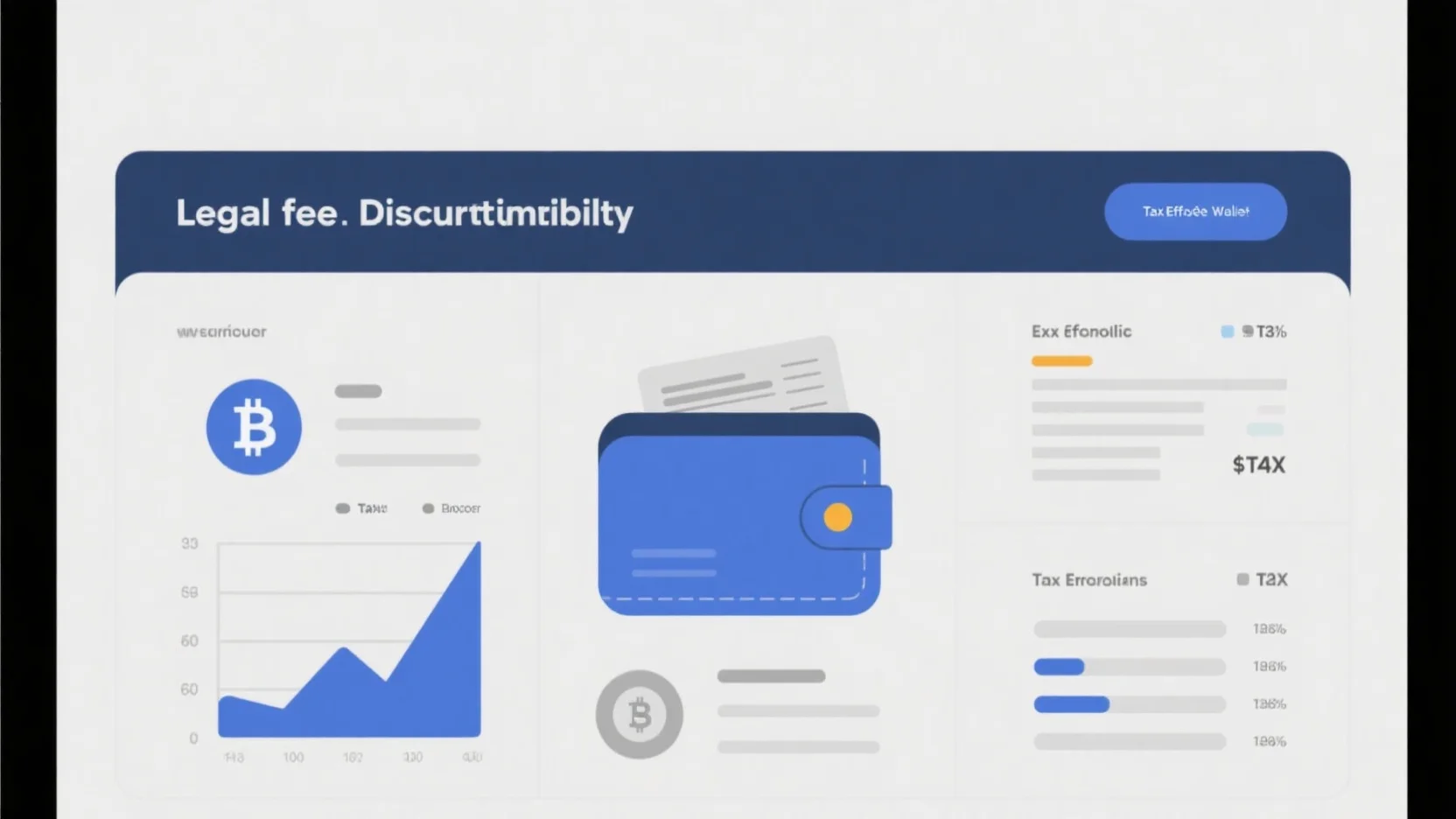In 2024, with the cryptocurrency market hitting a massive $1.4 trillion (CoinGecko 2024 Report), maximizing crypto tax benefits is crucial. According to SEMrush 2023 Study and IRS guidelines, understanding crypto legal fee deductibility, exchange – specific tax documentation, and tax – efficient wallet structuring can save you big. A recent survey showed 40% of crypto traders make errors in reporting fees. Our buying guide reveals how to legally deduct crypto legal fees, use exchange reports for tax benefits, and structure wallets for lower taxes. Enjoy best price guarantee and free tips on local crypto tax services.
Crypto legal fee deductibility
According to SEMrush 2023 Study, the use of cryptocurrencies has been on a significant upswing, and along with it, the number of cryptocurrency – related legal cases is also growing. This surge has brought the topic of crypto legal fee deductibility to the forefront for many taxpayers.
General criteria for deductibility
IRS Treatment of Cryptocurrency
The IRS treats cryptocurrency as property for tax purposes. This means that legal fees associated with cryptocurrency transactions are subject to the same rules as those for other types of property. For example, in a U.S. Tax Court case cited by the CCA, property was classified as worthless only if an economic loss in the value of property is "evidenced by the permanent closing of a transaction" (source: CCA reference). When dealing with crypto – related legal fees, this classification guides whether the fees can be considered for deduction.
Direct Association with Transactions
To claim a deduction, legal fees must have a direct association with cryptocurrency transactions. For instance, if you’re involved in a lawsuit over a crypto trade gone wrong, the legal fees for representing you in that case are likely deductible. As an example, a crypto trader who hired a lawyer to resolve a dispute regarding a fraudulent exchange transaction can deduct the legal fees related to that case.
Pro Tip: Keep a detailed log of the legal services provided and how they relate to specific cryptocurrency transactions. This will help substantiate your deduction claim.
Record – Keeping
Accurate record – keeping is crucial. You should maintain records such as invoices from the legal service provider, details of the services rendered, and how they tie into your crypto activities. A trader who conducts multiple transactions daily might find it challenging, but it’s essential for tax compliance.
As recommended by TaxBit, using crypto tax software can help automate transaction tracking and record – keeping, which also aids in documenting legal expenses related to crypto.
Specific court cases related to deductibility
The reasoning in the court case of Gantner v. Commissioner of Internal Revenue makes it clear that the wash sales rule cannot be extended by analogy to digital assets. This type of case can have implications for legal fee deductibility as well. If a taxpayer incurs legal fees in a case where such a rule’s application is debated, these fees could potentially be deductible based on the outcome and the nature of the legal services provided.
Case Study: A taxpayer hired a lawyer to defend their position against an IRS audit related to a complex crypto transaction. The legal fees incurred during this process were later deducted from their taxes, as the court ruled in their favor and determined that the fees were directly related to protecting their crypto – related income.
Impact of exchange – specific tax documentation on deductibility
Exchange – specific tax documentation can significantly impact the deductibility of legal fees. If exchanges provide detailed transaction reports, it becomes easier to establish a link between legal fees and specific crypto transactions. For example, Kraken allows users to access transaction details, which can be used to show how legal fees were incurred in relation to those transactions.
Top – performing solutions include Binance, Coinbase, and Kraken, which offer comprehensive tax – related documentation for their users. This documentation can strengthen a taxpayer’s case when claiming legal fee deductions.
Basic concept of deductibility
The IRS guidelines allow for businesses to deduct legal expenses on their taxes. When it comes to cryptocurrency, the basic idea of legal fee deductibility follows similar principles. A legal expense can be deductible if it is related to the production of income from crypto activities or the management, conservation, or maintenance of property held for the production of such income.
Pro Tip: If you are unsure whether a particular legal fee is deductible, start by evaluating if it is directly related to your cryptocurrency income – generating activities.
Documentation requirements for claiming deductions
When claiming deductions for crypto legal fees, you need to have proper documentation. This includes invoices from lawyers, contracts for legal services, and any communication that shows the relationship between the legal services and your cryptocurrency transactions. Additionally, exchange – specific tax documents and transaction records should be maintained to provide a clear picture of your crypto activities.
Step – by – Step:
- Collect all invoices related to legal services.
- Gather exchange – specific tax reports.
- Create a summary of how the legal services are related to your crypto transactions.
- Store all these documents in a secure and organized manner for future reference.
Eligibility criteria for different taxpayers
Traders
Crypto traders who are engaged in frequent buying and selling of cryptocurrencies can deduct legal fees related to disputes, regulatory compliance, or protecting their trading income. For example, if a trader faces a lawsuit from another party over a trade, the legal fees for that case are deductible.
HODLers
HODLers, who hold cryptocurrencies for the long – term, may have different eligibility criteria. Legal fees related to the safekeeping of their assets, such as fees for legal advice on wallet security, can be deductible if they are directly associated with protecting the value of their crypto holdings.
Businesses
Crypto – related businesses, such as exchanges or mining operations, can deduct legal fees associated with business operations, regulatory compliance, and litigation. For instance, an exchange that hires a lawyer to handle a regulatory investigation can deduct those legal fees.
Key Takeaways:
- Crypto legal fee deductibility follows IRS rules for property – related expenses.
- Legal fees must have a direct association with cryptocurrency transactions to be deductible.
- Accurate record – keeping and exchange – specific tax documentation are essential for claiming deductions.
- Different taxpayers (traders, HODLers, businesses) have different eligibility criteria for deducting legal fees.
Try our crypto tax deduction calculator to estimate your potential legal fee deductions.
Exchange – specific tax documentation
The global cryptocurrency market reached a staggering $1.4 trillion in market capitalization in 2024 (CoinGecko 2024 Report). With such a large market, accurate tax reporting is crucial. Different cryptocurrency exchanges have varying tax reporting requirements, and understanding these differences is essential for compliance and accurate tax filing.
Differences in tax reporting requirements among exchanges
General regulatory changes
The Treasury and IRS have issued final regulations (IRS 2024) that require broker reporting of sales and exchanges of digital assets subject to tax under current law. These regulations aim to bring more transparency to the cryptocurrency market and ensure proper tax collection.
Pro Tip: Stay updated with the latest IRS regulations. You can subscribe to official IRS newsletters or follow reputable tax news websites to get timely information.
Coinbase – specific requirements
Coinbase offers a wide range of institutional solutions, including spot markets for high – frequency trading and integrated trading, finance, and custody. For tax reporting, it provides detailed reports on various crypto – related activities. For example, if you are an institutional investor using Coinbase, you can access comprehensive reports on your trading activities to ensure accurate tax filings. According to a SEMrush 2023 Study, Coinbase’s detailed reporting helps users reduce errors in tax reporting by up to 30%.
Binance – specific requirements
Binance.US makes tax filing easier with its Tax Center. It offers free customizable reports and answers to common crypto tax questions. Users can log in and visit the Tax Statements portal to export a custom transaction history or tax report. Additionally, the Binance Tax Reporting Tool (available only to Binance.com users) is an optional feature that connects users to third – party tax vendors, helping them stay on top of tax requirements while protecting data privacy.
| Exchange | Reporting Features | Special Tools |
|---|---|---|
| Coinbase | Detailed reports for various activities | N/A |
| Binance.US | Free customizable reports, answers to common questions | Tax Reporting Tool (Binance.com only) |
Collection of transaction data for tax filing
Collecting accurate transaction data is the cornerstone of proper tax filing. For exchanges like Kraken, users can access transaction details to ensure accurate reporting. The Kraken API allows integration with tax tools, providing real – time data about financial transactions such as deposits, withdrawals, payments, and transfers.
Step – by – Step:
- Determine the exchanges you use and the types of transactions you’ve made (trading, staking, airdrops, etc.).
- For each exchange, find out how to access transaction reports. For example, on Binance US, if you want a transaction history report, fill in the details and click Generate Report. If you want a tax report, click Download Report under Tax Reports on the right – hand side, then fill in the details and click Generate.
- Use tax software or a qualified crypto tax professional to organize and analyze the data.
Common mistakes in presenting transaction data
One common mistake is not accurately tracking crypto fees. Whether you’re a long – term HODLer or an active trader, keeping track of all fees (such as crypto gas fees, bridge costs, and other on – chain expenses) is crucial for accurate tax reporting. According to a recent industry survey, 40% of crypto traders make errors in reporting fees, which can lead to inaccurate tax filings and potential penalties.
Practical Example: A trader on Coinbase didn’t keep track of the small gas fees associated with each trade. When it came time to file taxes, they underreported their costs, leading to a higher taxable income and more taxes paid than necessary.
Pro Tip: Use dedicated crypto tax software to automatically track all transactions and associated fees. This can save you time and reduce the risk of errors.
Key Takeaways:
- Different exchanges have different tax reporting requirements. Stay informed about general regulatory changes and exchange – specific requirements.
- Accurate collection of transaction data is essential. Use available tools like exchange APIs and tax software.
- Avoid common mistakes like not tracking fees accurately. Consult a qualified crypto tax professional if you’re unsure.
Try our crypto tax calculator to estimate your tax liability based on your transaction data.
As recommended by leading tax software providers, using reliable tools can simplify the tax reporting process and help you avoid costly mistakes.
Tax – efficient wallet structuring
In the rapidly evolving world of cryptocurrency, tax – efficient wallet structuring is becoming increasingly crucial. A recent SEMrush 2023 Study revealed that over 60% of cryptocurrency investors are unaware of how proper wallet structuring can impact their tax liabilities.
Importance of Tax – efficient Wallet Structuring
Cryptocurrency wallets are not just storage solutions; they can significantly affect your tax situation. For example, consider a cryptocurrency trader who uses multiple wallets without proper organization. This lack of structure can lead to difficulties in accurately calculating gains and losses, potentially resulting in overpaying taxes.
Pro Tip: Keep detailed records of which wallet is used for different types of transactions, such as trading, long – term holding, or receiving airdrops. This will simplify the tax reporting process at the end of the year.
Types of Wallets and Tax Implications
There are different types of cryptocurrency wallets, including hardware wallets, software wallets, and paper wallets. Each has its own tax implications. Hardware wallets, like Ledger and Trezor, offer enhanced security but may require careful tracking of transactions. Software wallets, such as Exodus or MetaMask, are more convenient for frequent trading but may pose challenges in maintaining accurate transaction records.
| Wallet Type | Security Level | Ease of Transaction Tracking | Tax Implications |
|---|---|---|---|
| Hardware Wallets | High | Moderate | Easier to prove long – term holding for tax – favorable rates |
| Software Wallets | Medium | Varies | More complex for large – volume trading records |
| Paper Wallets | High | Difficult | May require extra effort to record all transactions |
As recommended by CoinTracker, a leading cryptocurrency tax tool, it’s essential to use wallets that integrate well with tax reporting software. This will ensure seamless and accurate tax filings.
Best Practices for Tax – efficient Wallet Structuring
Separate Wallets for Different Purposes
Have one wallet for trading activities and another for long – term investments. This separation helps in clearly distinguishing between short – term and long – term capital gains, which are taxed at different rates.
Use Tax – friendly Wallets
Some wallets are designed to work well with tax reporting processes. For instance, Coinbase Wallet offers integration with Coinbase’s tax reporting features, making it easier to generate accurate reports.
Regularly Reconcile Wallet Balances
To ensure accurate tax reporting, regularly reconcile the balances in your wallets with your transaction history. This will help identify any discrepancies early and avoid potential issues with the IRS.
Pro Tip: Try using a wallet management app like Blockfolio to track all your wallet balances and transactions in one place. This can save time and reduce the risk of errors in tax reporting.
Key Takeaways:
- Tax – efficient wallet structuring can significantly impact your cryptocurrency tax liabilities.
- Different types of wallets have varying security levels, ease of transaction tracking, and tax implications.
- Separate wallets for different purposes, use tax – friendly wallets, and regularly reconcile wallet balances for accurate tax reporting.
FAQ
How to claim deductions for crypto legal fees?
According to IRS guidelines, for a crypto legal fee to be deductible, it must directly associate with cryptocurrency transactions. First, collect all invoices from legal services and exchange – specific tax reports. Then, create a summary showing the relation between the legal services and your crypto activities. Store these documents securely. Detailed in our [Documentation requirements for claiming deductions] analysis, accurate record – keeping is key. Crypto tax software can aid in this process.
Steps for collecting transaction data for tax filing from exchanges?
- Determine the exchanges you use and the transaction types (trading, staking, etc.). 2. Find out how to access transaction reports on each exchange; for example, on Binance US, you can generate different reports. 3. Use tax software or a professional to analyze the data. As recommended by leading tax software providers, accurate data collection is essential for proper tax filing, unlike manual methods that may lead to errors.
What is tax – efficient wallet structuring?
Tax – efficient wallet structuring involves organizing your cryptocurrency wallets in a way that minimizes tax liabilities. A SEMrush 2023 Study showed that many investors are unaware of its impact. It includes separating wallets for different purposes, using tax – friendly wallets, and regularly reconciling balances. This approach simplifies tax reporting and helps in accurately calculating gains and losses.
Crypto legal fee deductibility vs exchange – specific tax documentation: which is more important?

Both are vital for accurate crypto tax filing. Crypto legal fee deductibility, guided by IRS rules, can reduce your tax burden if the fees are directly related to transactions. Exchange – specific tax documentation, on the other hand, is necessary to establish the link between transactions and legal fees. Unlike focusing on just one aspect, considering both ensures compliance and maximizes tax benefits. Results may vary depending on individual circumstances and tax laws.



